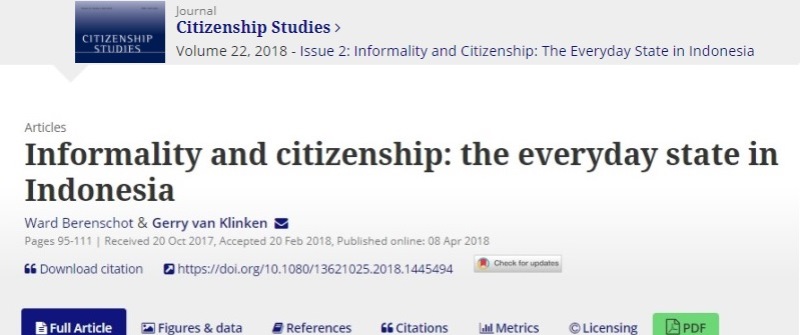
19 Apr Full open access: ‘Informality and citizenship: the everyday state in Indonesia’
Full open access: ‘Informality and citizenship: the everyday state in Indonesia’, Journal of Citizenship Studies.
Over the last four years KITLV and Universitas Gadjah Mada, together with Leiden University and the UvA, have been working on a research project on citizenship in Indonesia. Some of the results of this project have just been published in a special issue of the Journal of Citizenship Studies.
Various KITLV researchers have articles in this special issue. In their introduction Gerry van Klinken and Ward Berenschot try to convince scholars and activits that informality is a constituent element of citizenship. After that Chris Chaplin discussies the ideas of Salafi groups about Indonesian citizenship, Willem van der Muur discusses why customary land rights are much-debated but little-implemented, while Ward Berenschot, Retna Hanani and Prio Sambodho discuss the role of brokers in providing access to public services. Gerry van Klinken wrote a great historical overview of the evolving character of citizenship in Indonesia.
During this project we also got to know the work of others working on citizenship, some of which is included here: do read the pieces by Tanya Jakimov on voluntureerism, Vanessa Hearman on human rights and 1965 and Jessica Soedirgo on minority rights and anti-Ahmediyah violence. The special issue aims to push the debate on citizenship inside and outside Indonesia.
Abstract:
For many citizens in postcolonial states like Indonesia, the reality and experience of citizenship depend not just on the content of laws and regulations but also on the strength of their personal social networks. In this introduction to the special issue, we argue that instead of being antithetical to citizenship, this reliance on personal connections to deal with state institutions should be seen as a constitutive dimension of citizenship. Drawing on the articles in this issue, we illustrate this argument by discussing how informality in its three dimensions – mediation, the invocation of social norms and the use of social affiliations – shape the character of everyday state–citizen interaction in Indonesia. The cultivation of personal connections constitutes an important form of political agency. It enables citizens to deal with the unresponsive and unpredictable nature of Indonesia’s state institutions.




No Comments